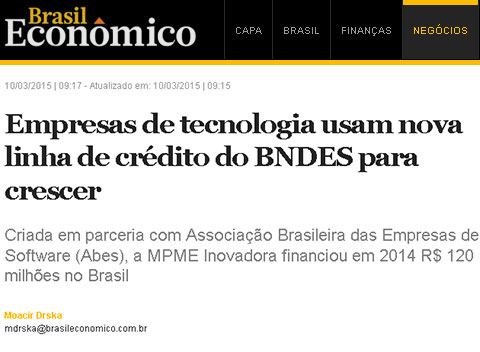Brasil Econômico - 03/10/2015 - Web

São Paulo – One of the main technology markets, Brazil still produces few examples of companies capable of standing up to multinationals in the sector. It is not uncommon for local companies to succumb to the challenge of balancing the expansion of their operations with the need to invest in innovations that bring advantages over foreign competition. This equation is at the heart of an initiative launched in August by the Economic and Social Development Bank (BNDES). Aimed at Brazilian companies with annual revenues of up to R$ 90 million and created in partnership with the Brazilian Association of Software Companies (Abes), the MPME Inovadora credit line ended 2014 with a total financed of R$ 120 million in the country. With access to these resources, some companies are already building a path to climb the competitive ladder.
Among other conditions, the credit line offered – until 2014 – loans with fixed interest of 4% per year, a grace period of up to four years and the possibility of financing the amount in up to 120 months. To apply for funding, the company needed to meet at least one of the requirements that classifies it as an innovator, such as, for example, ownership of software patents and registrations; and participation in incubators or innovation programs by entities such as Sebrae. “Innovation is a risky, long-term investment. It takes a considerable time to get a return on this investment”, says Roberto da Cruz, chief executive of Pixeon, a software company for the healthcare area, one of the businesses benefited by the initiative. “With these credit line conditions, we were able to dilute our risk and, at the same time, use our cash to invest in geographic expansion and sustain the company's growth”, he says.
With 1,500 customers, Pixeon is using the funding to expand its cloud computing portfolio. The idea is to cover the entire healthcare chain — patients, clinics, doctors and hospitals — with collaboration and management tools. For these projects, the company has a team of 35 professionals.
Expanding operations is also CataMoeda's idea. The company from Santa Catarina develops machines that are installed in establishments such as supermarkets and that collect coins deposited by consumers. In return, these customers have access to discount coupons at the chain's stores. The company financed R$ 860 thousand with a grace period of 24 months and an amortization period of 72 months. “We managed to create a smaller machine, which will help us expand our offer to other markets, such as drugstores, movie theaters and gas stations”, says Vanusa Uller, director of CataMoeda, which today has machines installed in 150 points of sale. sale and expects to close 2014 with more than 500 pieces of equipment in customers.
One of the points highlighted by the executive was the fact that the line does not require guarantees for financing up to R$ 1 million. “This is a difficulty for a technology company to have access to credit, since it is much more linked to intellectual assets”, he explains.
For Murilo Pessatti, chief executive of Chipus, a chip design company, one of the advantages is the fact that a large part of the process is carried out at the end, through BNDES partners, such as the Regional Development Bank of the Extremo Sul (BRDE ), the entity that led the financing in the South region, the first to receive the initiative. “From the start of the process to the release of the disbursement, it took us five months. Normally, in programs of this size, the term is at least one year”, he says. Chipus will allocate the value of R$ 670 thousand obtained to carry out three research projects, among them, the creation of a chip for smart energy networks. “We have a four-year grace period and by the end of this period, we will have products developed and revenue generation”, he says.
According to André Medrado, an analyst at the BNDES' Information and Communication Technology (ICT) department, one of the priorities was precisely a gap identified by the bank and Abes: smaller companies. These businesses were not served by programs like Prosoft, which have more restrictive criteria. “And with these regional partners, we managed to have more capillarity and speed to reach these companies”, he says. He says that the line will have changes in 2015, such as the increase in the annual rate to 6.5% and the fall in the BNDES' participation in financing the total value of the project, from 90% to 70%.
President of Abes, Jorge Sukarie adds that the next step is to strengthen partnerships to take the program — currently available in the southern states, and in São Paulo — to other regions. “Our idea is to launch the initiative this semester in Minas Gerais and Pernambuco, which already have relevant technology centers, such as Porto Digital”, he says.

